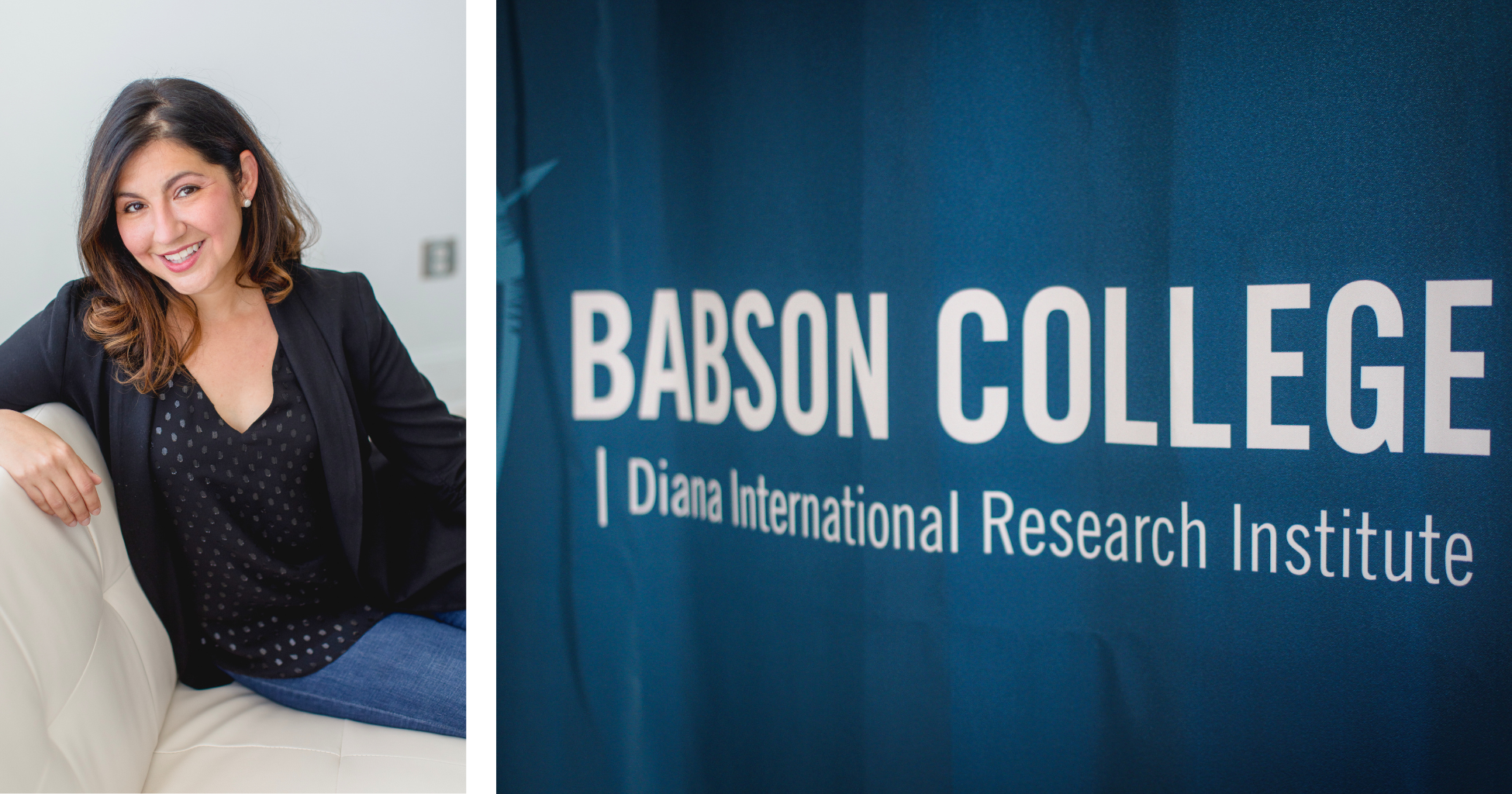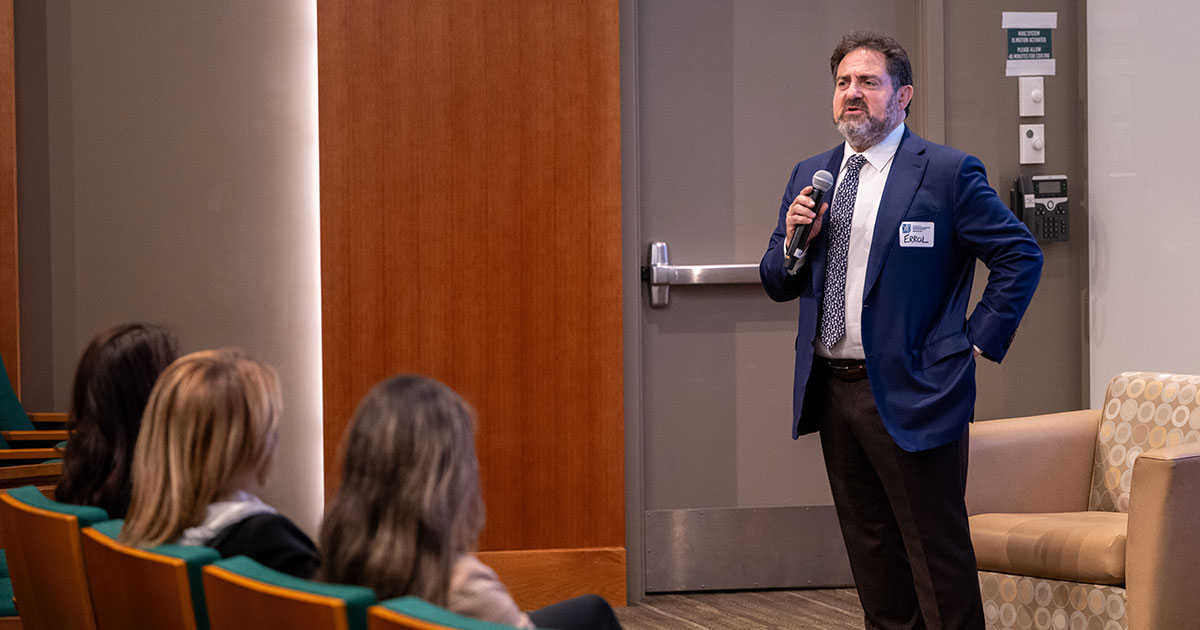Diana Leads Diana: Meet the New Faculty Director of the Diana International Research Institute

Sometimes it’s all in the name.
Meet Professor Diana Hechavarria, a researcher on early-stage entrepreneurship at Babson College, who will be taking over as the new faculty director of the Diana International Research Institute (DIRI). And no it’s not because she shares her name with the institute.
DIRI has continued to be the central place for all aspects of women’s entrepreneurship, which includes research, policy, and educator information. Currently, it sits within the Frank & Eileen™ Center for Women’s Entrepreneurial Leadership. Franklin W. Olin Professor of Entrepreneurship Candida Brush P’14 co-founded DIRI in 1999 and has been the faculty director for more than 25 years. She has since stepped down from that position.
Hechavarria, who started at Babson in 2024, has stepped in to continue DIRI’s legacy at Babson.
“Through DIRI, Babson became the go-to institution for rigorous, relevant research on women entrepreneurs and the ecosystems that support them,” Hechavarria said. “It’s a major reason Babson has such a strong international reputation in this space.”
What attracted you to Babson?
“I was drawn to Babson because of its unparalleled reputation as the global leader in entrepreneurship education and research. For someone who has dedicated their career to studying and advancing entrepreneurship, and especially women’s entrepreneurship, this was the ideal environment to amplify my work and collaborate with leading scholars and practitioners.”
What does it mean to you to carry on the legacy created by Candida Brush?
“Candy Brush is a pioneer in the field of women’s entrepreneurship research. She not only co-founded the Diana Project™, which has shaped the global conversation for more than 25 years, but she also created a scholarly community that now spans over 1,000 researchers worldwide. Carrying on that legacy is both an honor and a responsibility. For me, it means preserving the spirit of scholarly excellence and collaboration Candy built, while also expanding DIRI’s reach and ensuring it continues to influence policy, practice, and education around the world.”
In your view, what makes DIRI a true differentiator for Babson in the world of entrepreneurship research?
“DIRI sets Babson apart because it is the only global institute solely dedicated to advancing women’s entrepreneurship research. We are consistently ranked among the top conveners in entrepreneurship studies, and our outputs, from 13 special issues in top journals to 12 annual GEM Women’s Reports downloaded over 50,000 times, directly shape scholarly debates and policy decisions worldwide. This is not just about research for research’s sake; it’s about research that influences practice and elevates Babson’s thought leadership globally.”
“Babson is a place where entrepreneurship is not just taught but lived, woven into the culture of the institution.”
Professor Diana Hechavarria
What are you most excited about for this role? And what is your vision for DIRI’s future?
“I’m most excited about the opportunity to scale DIRI’s impact. We’ve already demonstrated DIRI’s ability to convene the top scholars globally, produce influential reports like GEM Women, and partner with organizations such as the World Bank and World Trade Organization. My vision for DIRI’s future is to deepen its role as the premier global hub for women’s entrepreneurship research, a place where data, scholarship, and practice converge. That means expanding our conferences and impact days, diversifying our funding model to ensure sustainability, and building stronger bridges between academia, policymakers, and entrepreneurial ecosystems.”
What are some of the most exciting insights emerging from recent research on women entrepreneurs?
“One exciting insight is the growing recognition of the diversity of women’s entrepreneurial experiences. Recent research shows that women entrepreneurs are not a monolith, their motivations, strategies, and constraints differ by context, whether that’s geography, industry, or stage of venture development. We’re also learning more about the impact of inclusive ecosystems: When entrepreneurial support organizations intentionally create inclusive spaces, women-led ventures not only thrive but also positively influence the broader ecosystem.”
Is there a particular research finding or trend in women’s entrepreneurship that you think deserves more attention right now?
“Yes, the issue of access to capital remains central, but what deserves more attention is the quality of capital and the terms under which women entrepreneurs receive funding. Research shows that even when women entrepreneurs secure investment, they are often subjected to more scrutiny and less favorable terms than their male counterparts. This has long-term implications for growth, equity, and innovation. Shining a light on these structural disparities is essential if we are serious about leveling the playing field.”



